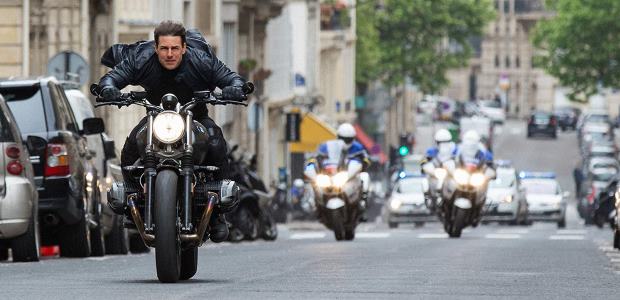By the sixth film, most modern cinematic franchises would be exploring how to perform a reboot, be shooting a prequel or simply fizzle out. Mission: Impossible continues to prove itself an exception, with Fallout extending the trend started with MI3 by being a stupendously entertaining, robust, all-out action film featuring stunningly executed stunts, distinctly gorgeous global locales and Tom Cruise sprinting all full speed to save the world.
Any attempt to describe the plot will make it sound egregious and generic, so it’s best explained by a series of extended (and generic) keywords – there is a botched mission, a terrorist plot is uncovered, the IMF agents are framed, identities (and allegiances) get mixed up, an old villain resurfaces, an older flame gets caught in peril, and finally, inevitably, Ethan Hunt saves the day. That last bit isn’t a giveaway; it’s where this and all other previous MI films have eventually and always led to. The fun, if that is your cup of tea, is watching how they get to that point and Fallout, with the exception of the last act where it seems to overstay its welcome, is solid in almost all those departments.
There are two big reasons for this. One of them is obvious – Cruise. Playing Ethan Hunt with the piercing moral compass to do good and protect his close-knit team above all else, he is in wildly impressive form for his age, leaping off mountains, riding bikes at full speeds and fighting off men twice his size. These attributes are given focus by the detailed, precise direction of Christopher McQuarrie, returning as director and the other piece of the winning equation. Fully aware of what works (Cruise’s derring-do and the IMF team’s camaraderie), and what doesn’t (cutting the wrong wire and bomb countdowns) he focuses on the first and tries to find novel ways to present the second, even if it’s still a bit tiring to sit through.
His biggest achievement specifically is the old world charm that he throws in (the inclusion of a vintage BMW is no accident). By now, the series has almost established itself as equal parts Bond meets Bourne, but McQuarrie references and mixes Friedkin (with the grittiness of French Connection) with Frankenheimer (with the relentless car chases of Ronin) in a sprawling, dizzyingly virtuoso sequence making full use of the circular surroundings of Paris’ iconic Arc De Triomphe turning it into the films impressive, energetic centerpiece. Rebecca Ferguson is also used in interesting ways – one part ruthless spy, one part black-clad femme fatale, ensuring MI6 make a presence in more than just the title.
As assertive and propulsive as Fallout is, however, problems start to surface when you realise it’s trying to do something none of the other films have done before (full marks for trying) – building connections to previous films. For me, one of the charms of the MI films has been that they’ve been largely standalone, with Cruise being the only constant. I am not sure if dipping into the past and making the world of the film seem bigger is part of a drive for more meaningfulness but it threw me off and I felt it was unnecessary. Plots have never been the strongest aspect of these outings, spectacle has. In a film where the plot itself is heavy on chases (on the ground, in the air, on foot), Fallout is best enjoyed (and remembered) when it’s displaying these chases and not unravelling its plot.
Rating: 




